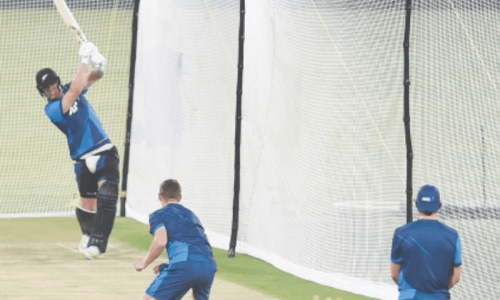LONDON: Nepal athlete Bikram Bahadur Rana on Monday set a new personal best at the Paralympics, capping an extraordinary journey to the British capital from the Himalayan nation where he was blinded by Maoist rebels.
Aided by a guide runner, the former warrant officer came fourth out of four in his T11 200m heat for blind and visually impaired athletes, clocking a time of 26.95sec, more than four seconds behind the quickest qualifier.
He was ultimately slowest of 18 runners overall but the former soldier, one of only a two-strong national team at the Games, is lucky to be in London at all, after nearly losing his life in the forests of central Nepal.
Nine years ago he and his foot patrol triggered two roadside bombs left by Maoist rebels hiding in the forest.
The explosion forced Rana to the ground, blinded and with blood pouring from an open wound in his neck as he scrambled for his rifle while bullets whizzed past and shrapnel burnt into his face.
Now 31, Rana told AFP before travelling to London that he has vivid memories of his last day of active service as a government soldier battling the 10-year Maoist insurgency that finally ended in 2006.
“It was the morning of September 12, 2003. A few rain drops were falling from the sky and we had reached a road area in dense forests,” he said.
“I was with two other soldiers when a bomb exploded. Both of my friends died on the spot and I was severely injured. My eyes were hurt, my face was covered with blood and there were wounds across my body.”
Rana searched desperately for his gun, coughing acrid black smoke and blinded in one eye, as a group of Maoist rebels sprang from the roadside trees and opened fire.
His life was saved when his comrades drove the insurgents back into trees.
His last memory before losing consciousness was the silence that descended.
“I also heard music which sounded like water flowing in a small river but I found out it was the noise of the flow of blood from my neck and abdomen,” he said.
Doctors battled to save the sight in one of his eyes in the coming days but after two weeks in an army hospital he was totally blind.
“I did not return to work for three months after the incident. I stayed at the hospital and with my relatives. But I did not want to live life doing nothing,” said Rana, who lives in Kathmandu with his wife and two children.
As part of his recovery, Rana was persuaded to visit the Nepal Association of the Blind, where he was inspired by an army major who was taking computer classes despite also having been blinded in the insurgency.
He started classes himself and as part of his training at the association’s headquarters in Kathmandu he was introduced to sport for the blind by a visiting cricket coach from Pakistan in 2008.
“I started competing in para athletics in 2008 and I became regional and national champion in the 200 metres in 2009,” he added.
Rana clocked 12.85sec in the 100m at the 2010 Guangzhou Asian Para Games, finished ninth among 32 runners and gaining a wildcard entry to the London Games.
The road to London hasn’t been easy for Rana and teammate Maiya Bishankhe, a women’s 100m runner who was born with only one forearm.
They have received little help from the authorities in Nepal, a country which does not invest in Paralympic sport and where facilities for disabled athletes are few and far between.
Rana, who is on Nepal’s provisional squad list for the Blind Cricket World Cup in Bangalore, India, in November, says they have had no advice on special diets and have not been provided with footwear and clothing for the Games.
He admitted that he did not expect to be among the medals but said getting to London was a major personal victory.
“I feel very proud of my accomplishments. Despite being blind, I will be able to compete carrying the flag of my country,” he said.
“I think the opportunity I have received being a blind athlete has made the country proud.”














































